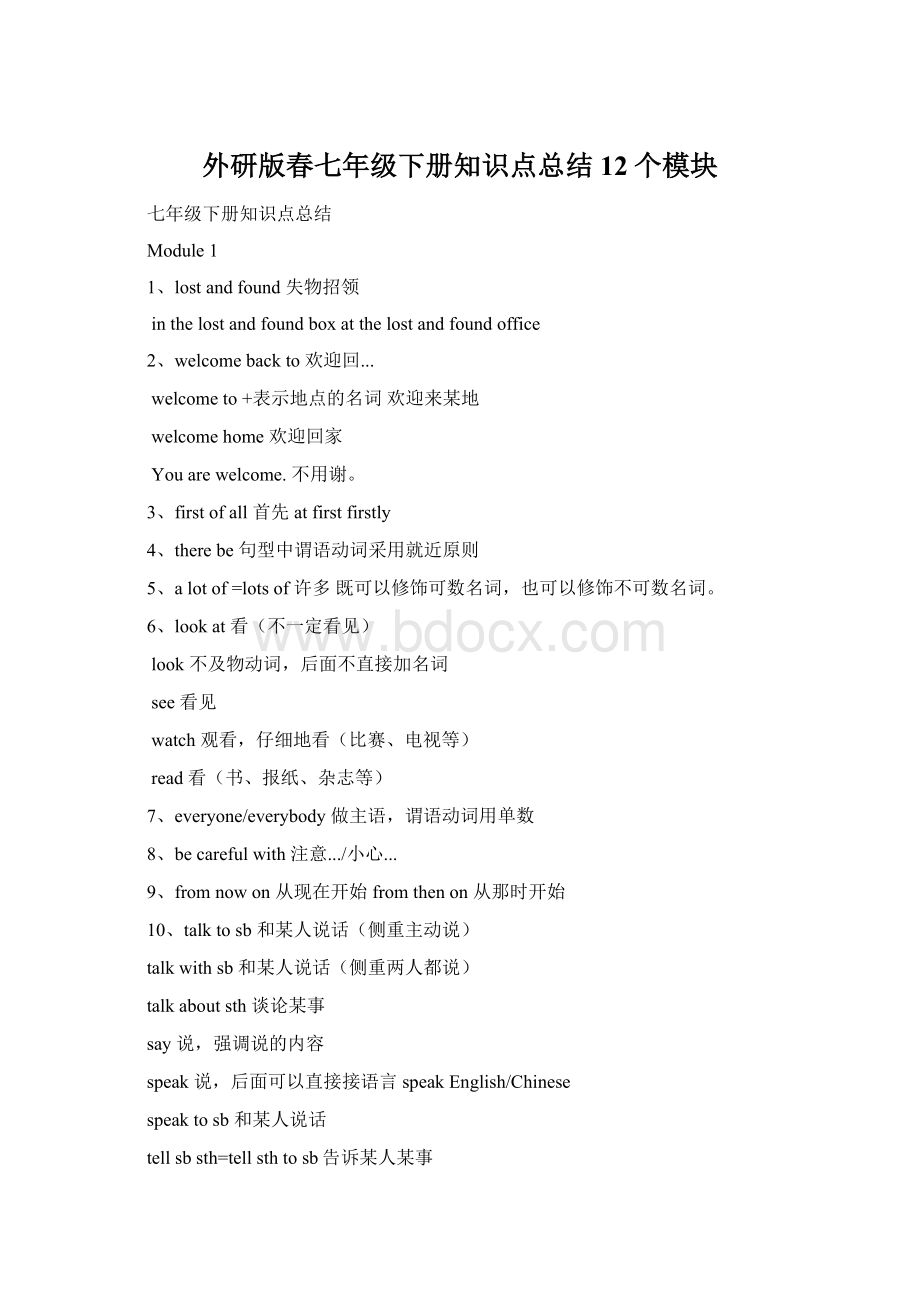外研版春七年级下册知识点总结12个模块.docx
《外研版春七年级下册知识点总结12个模块.docx》由会员分享,可在线阅读,更多相关《外研版春七年级下册知识点总结12个模块.docx(25页珍藏版)》请在冰豆网上搜索。

外研版春七年级下册知识点总结12个模块
七年级下册知识点总结
Module1
1、lostandfound失物招领
inthelostandfoundboxatthelostandfoundoffice
2、welcomebackto欢迎回...
welcometo+表示地点的名词欢迎来某地
welcomehome欢迎回家
Youarewelcome.不用谢。
3、firstofall首先atfirstfirstly
4、therebe句型中谓语动词采用就近原则
5、alotof=lotsof许多既可以修饰可数名词,也可以修饰不可数名词。
6、lookat看(不一定看见)
look不及物动词,后面不直接加名词
see看见
watch观看,仔细地看(比赛、电视等)
read看(书、报纸、杂志等)
7、everyone/everybody做主语,谓语动词用单数
8、becarefulwith注意.../小心...
9、fromnowon从现在开始fromthenon从那时开始
10、talktosb和某人说话(侧重主动说)
talkwithsb和某人说话(侧重两人都说)
talkaboutsth谈论某事
say说,强调说的内容
speak说,后面可以直接接语言speakEnglish/Chinese
speaktosb和某人说话
tellsbsth=tellsthtosb告诉某人某事
11、lookfor寻找(不一定找到)
find(偶然地)找到
findout查明,找到(经过努力)
search搜索,调查
lookover检查
lookafter=takecareof照顾
lookforwardto期盼,期待
12、getonthebus上公交车
getoffthebus下公交车
13、inahurry匆忙地
hurryup=comeon快点儿
hurrytodosth匆忙做某事
14、hundredsof成百的(大约数加s,加of)
twohundred(具体数不加s,不加of)
同样用法还有thousand、million、billion
15、everyday每天
everyday每天的(形容词,后面接名词)
16、atthemoment=atthismoment=now此时此刻,现在
atthatmoment=then在那时
17、suchas例如,后面不加逗号
forexample例如,后面加逗号
18、帮助某人做某事helpsb(to)dosth/helpsbwithsth
19、--whose...isthis?
这是谁的...?
--It’s+名词性物主代词.
20、Arethese...+名词性物主代词?
这些...是某人吗?
语法:
人称代词与物主代词
Module2
1、play后接乐器时,乐器名词前要加the;playthepiano/violin
接球类、棋类名词时,不加the;playtabletennis/football/basketball
2、rideabike骑自行车
3、thenewclubsforthisterm这学期的新俱乐部
4、wouldlike=want
wouldliketodosth=wanttodosth想要做某事
wouldliketobe=wanttobe想要成为...
wouldlikesth=wantsth想要某物
5、join加入(团体、组织),并成为其中一员
joinin加入活动
takepartin参加加入活动(侧重发挥积极作用)
Attend出席会议,到场,上课等
6、whataboutyou?
=howaboutyou?
=andyou?
你呢?
whataboutdoingsth?
=howaboutdoingsth?
做某事怎么样?
7、因为because所以so不能同时出现在一个句子中
8、that’sall仅此而已,就这么多
9、worryabout=beworriedabout担心...
don’tworry不用担心
10、teachsbsth=teachsthtosb教某人某事
11、favourite=like...best最喜欢
12、really副词,修饰形容词或动词runreallyfast
real形容词,修饰名词realstory
13、thestartof=thebeginningof...的开始
14、geton/alongwell/badlywithsb和某人相处的好/不好
15、workhard努力学习
16、be/getreadytodosth乐于做某事,准备好做某事
17、选择...作为choose...as/choose...for
18、promisetodosth承诺做某事,保证做某事
19、marry做不及物动词,意为”结婚”.
做不及物动词,意为”嫁,娶,与……结婚.(marrysb.)
在非正式英语中,一般用getmarried或bemarried来表示结婚这件事.这两个短语后都可接介词to,意为”和……结婚”
20、enjoy后面接名词或动词ing形式
21、between在两者之间
22、begoodat=dowellin擅长
23、getthebestscore得到最好的分数
24、docleaning打扫卫生
dosomeshopping买东西=goshopping
docooking做饭
doreading看书
25、tidy整洁的--(反)untidy
tidy(it)up整理
26、besure确信
27、acleanclassroom,
28、justlike(像)just就,仅仅
29、makesb/sth+形容词(或介词短语)使某人/某物怎么样
makeourclassroombeautiful
maketheclassroomjustlikehome
makesbdosth使某人做某事
30、bekindtosb对某人友善
31、trytodosth尽力做某事
trydoingsth尝试做某事
32、flyakite放风筝
31、whatcanyoudo?
语法:
can
肯定句结构主语+can+动词原形+其他.
否定句结构主语+can’t(cannot)+动词原形+其他.
一般疑问句把can提前
肯定回答Yes,主语+can.
否定回答No,主语+can’t.
Module3
1、makeplans制定计划makeaplan
2、attheweekend在周末
at+时间点/节假日前
on+具体某一天onSaturdaymorning
in+时间段,
inthemorning/afternoon/evening泛指一天的上午、下午或晚上
3、goover复习
4、doone’shomework做作业
5、helpwithsth帮忙做某事
helpwiththehousework
6、seeamovie看电影
7、whoelse还有谁else其他的
whatelse还有什么
8、haveapianolesson上钢琴课
9、comewithsb和某人一起来
with连接两个主语时,谓语动词用就远原则
10、haveapicnic去野餐
11、--wouldyouliketodo...?
--Yes,I’dloveto.
12、stayathome待在家里
13、alone=byoneself单独,独自
14、don’tbesilly别傻了
15、no=notany
16、人spend时间/金钱(in)doingsth.
花费onsth
度过表示地点的介词短语
物/事情cost人+金钱/时间.
It/事take(s)人+时间.
人pay(金钱)for物.
17、I’mnotsure.不确定.
18、lookforwardto后接代词、名词或动名词
19、makefriendswithsb和某人教朋友
20、wear穿,(强调穿着,状态)宾语是衣服
puton穿上,(强调动作)宾语是衣服
dress穿衣,(强调动作)宾语是人
dresssb./oneself给某人/自己穿衣打扮
21、hopeforsth希望...
hopetodosth希望做某事
hope+that从句希望...
注意:
有wishsb.todosth.的用法,hope没有这种用法!
22、win后面接比赛、游戏等
winthematch赢得比赛
23、enjoyoneself=haveagoodtime=havefun玩儿得愉快
24、getup起床
25、takeawalk=go(out)forawalk去散步
26、bedifferentfrom与...不同
bethesameas与...相同
27、summercamp夏令营
28、gosightseeing去观光
goshopping去购物
goboating去划船
goswimming去游泳
29、dosomesports做运动
30、see/visitfriends看望朋友
31、It’stimeforsth.=It’stimetodosth.该做某事了.
语法:
一般将来时begoingto+动词原形
一共四个要素,一个也不能少!
肯定句结构:
主语+begoingto+动词原形+其他.
否定句结构:
主语+benotgoingto+动词原形+其他.
一般疑问句:
be动词提前
Be+主语+goingto+动词原形+其他?
肯定回答:
Yes,主语+be.否定回答:
No,主语+benot.
注意:
表示计划到某地去,谓语动词go与going重复,一般只说begoingto+地点.
Module4
1、inthefuture在将来
infuture从今以后
2、chalk、paper为不可数名词
apieceof+chalk/paper
3、in+一段时间,句子用将来时
对in+一段时间提问,用Howsoon
4、maybe可能,也许一般放句首
maybe可能放句子中,may是情态动词,be是谓语动词,用原形.
5、use...todosth用...做某事
6、ontheInternet在网上
byInternet通过网络
by+交通工具bybus
7、beableto=can后接动词原形
注意:
can只有could和原形两种形式
beableto可以有各种时态
8、not...anymore=no...more不再...
9、answerone’squestion回答某人的问题
10、needtodosth需要做某事,need是实义动词,有形式变化
need做情态动词用时,后接动词原形,无变形
11、job指具体的工作,为可数名词
work工作,为不可数名词
12、cometrue实现常与dream、idea连用
13、meansth意味着
meandoingsth意味着做某事
meantodosth打算做某事
14、kind种类
akindof一种
allkindsof各种各样的
kind友善的,形容词
kindly友善的,副词
15、lightrain小雨--(反)heavyrain
16、物做主语时,用expensive或cheap
价格(price)做主语时,用high或low
17、notonly...butalso...不仅...而且...
also可省略
连接两个主语时,谓语动词就近原则
18、trafficjam交通堵塞复数~jams
19、haveto不得不相当于must,用法同情态动词
20、carry拿,带不强调方向
bring带来
take带走
21、change可做名词,也可做动词
changeAintoB把A变成B
语法:
一般将来时will
肯定句结构:
主语+will+动词原形+其他.
否定句结构:
主语+willnot+动词原形+其他.
一般疑问句:
will提前
Will+主语+动词原形+其他?
肯定回答:
Yes,主语+will.
否定回答:
No,主语+won’t(willnot).
注意:
begoingto表示自己打算做某事,计划做某事或有意做某事
will则表示对未来的猜测
Module5
1、buysbsth=buysthforsb为某人买某物
makesbsth=makesthforsb为某人做某物
cooksbsth=cooksthforsb为某人做...
2、onMother’sDay在母亲节
3、购物相关句型
WhatcanIdoforyou?
CanIhelpyou?
Whatcolourdoesshelike?
Whatsizedoesshetake?
MayItryiton?
There’sasaleontoday.
Howmany/muchwouldyoulike?
Howmuch+be+sth?
I’lltakeit.
I’vegotsomefoodtobuy.
4、Whatabout...?
=Howabout...?
...怎么样?
5、tryon试穿
puton穿上
trunon打开
holdon等一下(电话用语)=waitaminute
comeon加油
6、Certainly.=Sure.=Ofcourse.当然。
7、toomuch太多(修饰不可数名词)
toomany太多(修饰可数名词)
muchtoo太(修饰形容词)
8、halfakilo一斤
halfprice半价
9、Whatelse还有什么
Whoelse还有谁
10、五个半系动词,(五个起来)后面接形容词
look、smell、sound、taste、feel
11、afamilymember家庭成员
12、onlineshopping网上购物
13、oneof......之一,后接名词复数
14、afewdayslater几天后
afewdaysearlier几天前
15、advantage-反义词disadvantage
16、atanytime在任何时间
17、campareAwithB把A和B做比较
18、savemoney省钱
makemoney赚钱
save还有“保存,拯救”的意思
19、payovertheInternet网上支付
20、wayoflife生活方式
21、oneday一天,可以指过去,也可以指将来
someday一天,只可以指将来
22、noone做主语,谓语动词用单数
23、beableto=can能
24、because后面接句子
becauseof后面接名词或名词性短语
25、andsoon相当于省略号
语法:
特殊疑问句相当于特殊疑问词加一般疑问句
what什么
whatcolour什么颜色
whatsize多大号
whattime=when什么时间
howmany多少,对数字提问
howmuch多少,提问价格或不可数名词
howoften提问频率
howsoon多久(以后)
howlong多长
howfar多远
howhigh多高(多用于问不与地面接触的东西)
howtall人,动物,树木等有生命的东西,多高
which哪一个
who谁
whom谁(宾格),一般情况下可用who代替
whose谁的
where哪儿
why为什么,多用because回答
Module6
1、问路相关句型
Couldyoutellmehowtogetto...?
Canyoutellmethewayto...?
Canyoushowmethewayto...?
Istherea...nearhere?
HowcanIget/goto...?
/getthere?
HowdoIgetto...?
/getthere?
Whereisthe...?
2、getto=reach=arriveat(小地点)/in(大地点)到达
3、infrontof在(外面的)前面
inthefrontof在(里面的)前面
4、goacross=cross穿过(横穿)
5、goalong=godown=walkalong=walkup=follow沿着
6、turnleft向左转
turnaround转身
7、atthethirdstreet在第三条街
8、overthere在那儿
9、ontheright/left在右边/左边
10、opposite...在...的对面
11、tour旅游--tourise游客
12、besure确信
I’mnotsure.我不知道。
13、Whynotdosth?
=Whydon’tyoudosth?
14、anundergroundstation一个地铁站
15、take+冠词(a、the)交通工具to+地点=goto+地点by交通工具
16、Thanksalot.=Thanksverymuch.
17、(in)themiddle/centreof(在)...的中心
18、walkalong...to沿着...到
19、above...在...的上面
20、mostof...大部分的
21、onaclearday在晴朗的一天
22、thebestwaytodosth做某事最好的方式
23、near=nextto=closeto在...的附近
24、as可以相当与when当...时
25、getoff下车、船
geton上车、船
26、over=morethan超过
over900yearsold
27、gopast=pass路过、走过
28、turnleftinto向左转进入
29、finishsth/doingsth完成某事/做某事
30、needtodosth需要做某事
31、betweenAandB在A和B之间,between用在两者之间
32、partof......的一部分
33、learnabout了解
34、ontheotherside在另一边(两边中的另一边)
常用于one...theother表示两者中的一个...另一个...
35、on表示处于„„之上,强调与表面接触。
over表示在某人或某物的正上方,反义词是under。
above表示位置高于某人或某物。
但不一定是正上方,反义词是below。
36、onthecorner(of)...在...的拐角处
Module7
1. 序数词前有形容词性物主代词或者名词所有格、形容词时,前面的the省略 例如:
my first teachers, Tony’s fifth birthday.
2. ......的名字是什么?
What’s the name of ...?
/What was the name of ...?
如:
What was the name of your first school?
What are the names of your brothers?
3. What is/are/was/ were ......like?
对品质、性格提问用 What does ......look like?
对相貌提问用
What does ......like?
对兴趣、爱好提问
例:
----What was your first friend like?
----He was friendly and good.
----What does your first friend look like?
----He is tall and thin.
----What does your first friend like?
----He likes swimming.
4. 出生于be born用语过去时(born为bear的过去分词,过去式为bore)
例如:
They were born in 1999, but I was born on December 19th, 2000.
5. be strict with sb. 对某人严格、严厉/ be strict in sth. 对某事严格、严谨
例如:
My mother is strict with me but she isn’t strict in her work.
6. be friendly to sb. 对某人有好, 类似的结构还有be kind to sb.
例如:
She is friendly to us everyone. friendly 反义词 unfriendly
以ly结尾的形容词还有,lovely,lonely,ugly,silly,weekly,monthly等
7.(a) very adj./adv.(原形) + n.太....,非常....,很.....
quite( a/ an)+